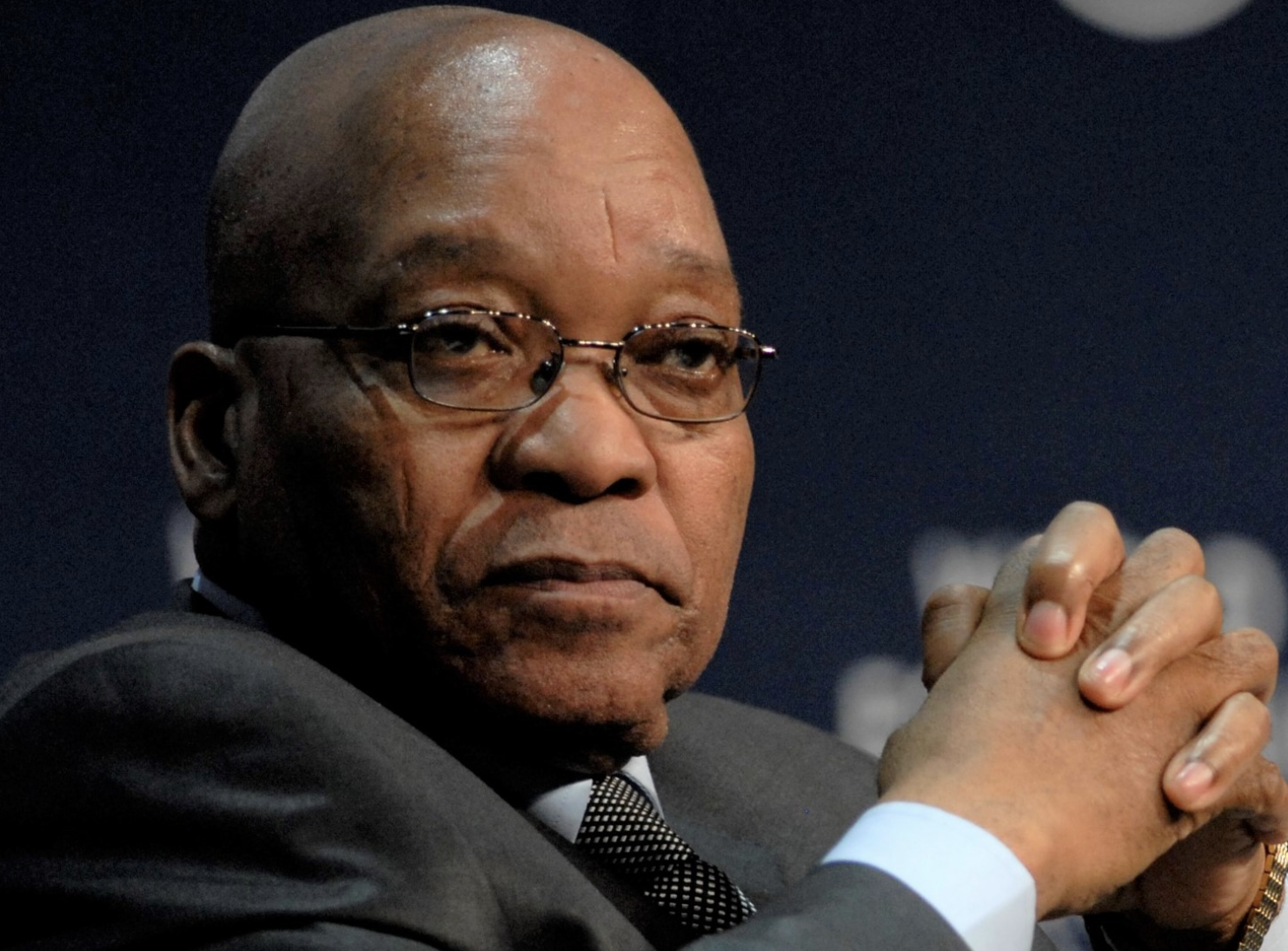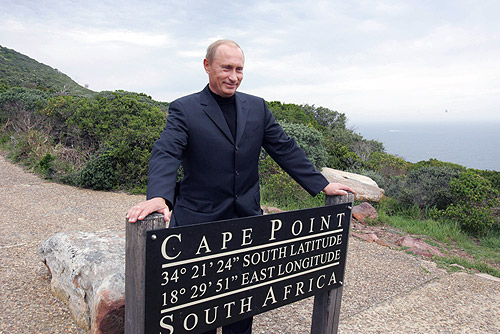News
Zuma, Ramaphosa, Mashatile: SA Business Must Finally Accept the Problem is the ANC Itself
Some 115 CEOs are reported to have signed a pledge to help fix the government. Will this initiative make a difference by addressing the country’s fundamental challenges? Or will it be another pre-election press release that does little to change things, except improve the ANC’s chances of being re-elected?

Director, The Brenthurst Foundation

Research Director, The Brenthurst Foundation

During Thabo Mbeki’s time at the top, there was a rumble in business circles for a president less “aloof”. Jacob Zuma was welcomed in some quarters as a more “hands-on” executive, more connected with the people’s concerns, who would let those around him get on with the job. Business Unity SA (Busa) CEO Jerry Vilakazi said at the time: “We are pleased that the election of Mr Zuma creates certainty for the markets as to who is likely to lead the country in 2009.”
Remarkably, no concern was expressed at Zuma’s record of corrupt relationships following the jailing of his financial adviser, Schabir Shaik. Judge Hilary Squires mentioned Zuma 474 times in the publicly televised judgment, leading to the inescapable conclusion that Zuma had received bribes in exchange for using his influence, something for which he is still on trial, some 18 years later.
Vilikazi spoke instead of “the challenges that lie ahead”, which he defined as “unemployment and poverty”. The inescapable conclusion is that organised business thought it could do business with Zuma, moral quibbles aside.
Such optimism proved wishful thinking as Zuma emerged as less “hands-on” than “hands-in” (the till). Among the few who called it right at the time, Helen Zille stood out. Of the so-called “people’s person”, the DA leader warned: “This is a dismal day, not only for the ANC but for South Africa. It is an indictment on the ruling party that they could find no better candidate than Jacob Zuma to lead them.
“The Polokwane conference has also exposed many of Zuma’s supporters as unruly and ill-disciplined populists who cannot observe the basic norms of decent, democratic behaviour. These are the people to whom Zuma owes his election as ANC president and he will have to return the favour. He will be accountable to them.”
Only once civil society, the courts and the public at large turned on Zuma over his brazen State Capture project, did business finally find its voice. It took the 2017 firing of Pravin Gordhan as finance minister and his replacement by Malusi Gigaba to elicit a statement by the then Busa president, Jabu Mabuza, that the timing of the decision (note: the “timing”, not the decision itself) was “unfortunate”. He hastily added that business respected the president’s prerogative and intended to work with the new ministers.
You could almost see the hands wringing.
Inevitably, Cyril Ramaphosa was welcomed as signalling the end of the chaos and corruption of the Zuma years, as a person who would understand what business wanted and needed, since he was from business — never mind the outstanding fact that he had made his money from his political connections.
And his pandering to the radical factions was seen as a means to keep the party together, keeping all sides, left and right, in the tent. “Radical economic transformation is, in essence, about building a more equal society through sustained inclusive growth,” explained Ramaphosa in 2017. On taking over the presidency in February 2018, he said, “A new dawn is upon us and a wonderful dawn has arrived.” This proved to be a false start, in spite of the positive affirmation of the business community.
Among Ramaphosa’s strategies was the embracing of an EFF initiative to amend the Constitution to introduce unchecked land expropriation by the government, a move which eventually failed when the ANC and EFF could not agree on exactly how to parcel out the proceeds of this action.
Business confidence, which rose sharply on his taking over to register 45 on the RMB/BER Index, had fallen to just 36 in the first quarter of 2023. This index, which was overall higher during the Zuma than the Ramaphosa presidency so far, has barely been in positive territory — a score of over 50 — since 2008.
And now, we are told by some that Paul Mashatile is more decisive than the incumbent and will be the change that South Africa needs.
‘Perilous lunges and blunders’
What if the problem is business itself, at least those elements which view South Africa through a celebrationist lens? The problem is that business never found a government it didn’t like, and refuses to believe in the worth of change, just as it largely — with a few exceptions — was never in the vanguard of political change under apartheid until very late in the day.
Now, of course, it’s hard to find a businessperson from that era who was not a clandestine insurgent. Moral weakness plays out this way in the political theatre. When awful decisions are made they are excused as sophisticated manoeuvring to achieve some higher objective at an unspecified future date.
In Max Hastings’ excellent book Abyss, which describes the conditions which led to and the approach which ultimately resolved the Cuban Missile Crisis in October 1962, the veteran journalist makes the following insight into the failure of US policymakers who wanted to believe that Nikita Khrushchev was actually a brake on Soviet radicalism:
“That group of clever, puzzled Americans felt driven to a conclusion — a false conclusion — that Khrushchev was struggling against foes inside the Kremlin; that the latest proposal superseded the earlier one, because the Soviet leader had been obliged by Presidium comrades to make it. They could not grasp the reality, that Khrushchev was floundering in a morass of his own creation…”.
Both sides had made mistakes in the process of politics that had led to the crisis, what Hastings describes as their “share of perilous lunges and blunders”. In the Soviet camp, this included the “failed strangulation” of West Berlin in 1948-49, the June 1950 North Korean invasion of the South, and the 1956 Soviet suppression of the Hungarian Uprising. Hubris towards China over Korea, the various state-sponsored coups in Latin America and the failed 1961 Bay of Pigs invasion along with the start of the “long Vietnam agony” all fall into the US side of the ledger.
But while explaining why the two sides got to the missile crisis, these failures did not limit US President John F Kennedy’s options. On the contrary, the crisis illustrated just how pusillanimity could simply have emboldened Soviet aggression. Ultimately, Kennedy opted not for invasion or bombing, but a quarantine, which signalled a line that should not be crossed, while de-escalating the military stand-off.
Being a prisoner of the past provides the perfect excuse for inaction and the tolerance of blatant transgressions.
Mistakes continue to be made
In the same vein, blunders exist on both sides of the South African business-government divide.
And mistakes continue to be made. The recently-announced “compact” between the CEOs of large South African companies and government departments is put forward as a necessary approach to tackle the country’s energy, crime and logistics challenges.
The head of Business Leadership SA said of the announcement of this business-government partnership: “This is the beginning of a journey that government and business will walk together. The issues South Africa must deal with are deep and will require serious commitment from both sides. It must be focused on action and not political expediency.”

Appropriate public bodies have been lined up to partner with private sector agencies for each stream. The National Energy Crisis Committee, National Logistics Crisis Committee and Joint Initiative to Fight Crime and Corruption will be the main vehicles for government engagement. This process will also draw on officials from different government departments, Operation Vulindlela and, in the crime workstream, the National Joint Operational and Intelligence Structure. Each workstream is to be assisted by various organised business structures.
There will be no lack of spinning plates and full diaries. But to what end?
As its electoral fortunes slide, the ANC continues to avoid grasping the nettle and reforming its vast, bungling state-owned enterprises. It is obvious that it needs to bring in the private sector. But instead of seeking desperately needed private sector investment, it is asking for charity.
Business has fallen for a political chimera. It will help the ANC shore up public enterprises ahead of next year’s election and then, its services no longer needed, watch aghast when the next government (likely to be formed by the ANC or an ANC coalition) brings out the lash with a new raft of populist policies.
This process presumes that government is merely incompetent, but still honest. Yet as Chief Justice Raymond Zondo makes clear, there is a web of criminal activity networked into the African National Congress. The heart of the problem is not technical, as the businesses’ various workstreams essentially argue, but political. Only political change can change this for the better, just as apartheid could not be reformed through technical inputs.
To think otherwise is delusional, a circus of falsehoods. No amount of frantic activity, earnest think-pieces, consultation and committees, workstreams or public fluency is a substitute for the reforms necessary. Without real skin in the game, business knows it is just playing a game as its least bright (who draw the short straw at HQ) are sent into the vast labyrinth of meetings, meetings about meetings, task teams, and the like, to fight the hydra of corruption which never shows its face.
Palace intrigue, embedded placement, and poise and polish do not stack with the task of strategic change and leadership.
Solving the South African failure to reform thus does not require more institutions, or more institutions working in harness with one another. It demands answering the question: Why does the government not reform when the problems are clear? Is this because it lacks the ability to problem-solve and to execute solutions; or is there a different, deeper malaise in that, even when clear policy decisions are made, there is a reluctance in the bureaucracy and within state-owned enterprises to execute decisions to bring in private partners, because of vested financial interests, in that this dilutes the rents that accrue to the politically connected?
The problem is politics. The problem with Zuma, Ramaphosa and, probably, Mashatile, is that their politics have been learnt from within the ANC. Until that changes, South Africa will remain stuck, despite — and indeed because of — the thinking of business.
This article originally appeared on the Daily Maverick
Photo: World Economic Forum

